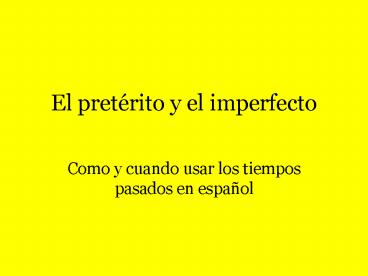El pret - PowerPoint PPT Presentation
1 / 11
Title:
El pret
Description:
El pret rito y el imperfecto Como y cuando usar los tiempos pasados en espa ol El pret rito Words that are hints for using preterit: Ayer Anteayer El mes pasado ... – PowerPoint PPT presentation
Number of Views:50
Avg rating:3.0/5.0
Title: El pret
1
El pretérito y el imperfecto
- Como y cuando usar los tiempos pasados en
español
2
El pretérito
- Generally speaking, the preterit is used for
actions in the past that are seen as completed.
Use of the preterit tense implies that the past
action had a definite beginning and definite end.
- For example
- Compré uno zapatos para mi hijo. I bought a pair
of shoes for my son. - Dónde comió usted ayer? Where did you eat
yesterday? - Comí en casa de Carlos y hablé con su padre. I
ate at Charless house and spoke with his father.
3
El pretérito
- The preterit is used for past events that
happened once and at a very specific moment in
time, such as Last night I went to the movies. - The preterit is also used for incipient action,
meaning action that we see begin, such as "the
sun came out" as opposed to an imperfect weather
statement such as "It was sunny yesterday". - When action begins or ends (ex I met Felipe.
She graduated from college. The class ended at
915.) we use the preterit. - Furthermore, when action is interrupted (ex We
were golfing when it started to rain.") the verb
that stops the action is in the preterit.
4
El pretérito
- Words that are hints for using
- preterit
- Ayer
- Anteayer
- El mes pasado
- Anoche
- El año pasado
- En ese momento
- El otro día
- Esta tarde
- Hace dos años
Note that these expressions indicate specific
time frames!
5
El pretérito
- The conjugations are as follows
- AR
- -é -amos
- -aste -asteis
- -ó -aron
- ER/IR
- -í -imos
- -iste -isteis
- -ió -ieron
6
El imperfecto
- The Spanish imperfect usually translates into
English as "used to" or "would" for example - When we were young we USED TO EAT cereal. (We may
still eat cereal today.) - As a child we WOULD EAT cereal. (We might
still.) - In the sentence "As a child I lived in Chicago"
the listener does not have enough information to
determine when the speaker arrived in Chicago or
when he/she left. It is possible that he/she
still lives there. - The imperfect can also be used as a past
progressive, such as "They WERE EATING". - The general rule is that if you do not know when
the action began or ended, it takes the
imperfect. - However, there are some cases in the past that
almost always take the imperfect. - Unless you have a clear beginning (incipient
action), use the imperfect to describe the
following in the past
7
El imperfecto
- Age
- Tenía 12 años cuando robé el primer carro.
- I was 12 when I stole my first car.
- Weather
- Hacía buen tiempo cuando me arrestaron.
- It was nice weather when they arrested me.
- Emotional states
- Mi amigo estaba nervioso porque era la
medianoche. - My friend was nervous because it was the middle
of the night.
- What people were doing WHEN something else
happened - Me duchaba cuando sonó el teléfono.
- I was showering when the phone
- rang.
- Habitual past actions
- Íbamos a la playa cada verano.
- We went used to go to the beach
- every summer.
- Time
- Eran las nueve de la noche.
- It was nine o'clock at night.
8
El imperfecto
- Words that are hints for
- using Imperfect
- Siempre
- Cada (año, día...)
- Usualmente
- Generalmente
- Normalmente
- Muchas veces
- En general
- En el pasado
- Todos los días
Note that these expressions indicate repetitive,
vague or non-specific time frames!
9
El imperfecto
- The conjugations are as follows
- AR
- -aba -ábamos
- -abas -abáis
- -aba -aban
- ER/IR
- -ía -íamos
- -ías -íais
- -ía -ían
10
El imperfecto
- BUENAS NOTICIAS
- Solo hay tres verbos irregulares en el imperfecto
- SER era, eras, era, éramos, erais, eran
- IR iba, ibas, iba, íbamos, ibais, iban
- VER veía, veías, veía, veíamos, veíais, veían
11
Verbs That Change Meaning
Verbo Pretérito Imperfecto
conocer met knew
querer tried wanted
no querer refused did not want
saber found out knew
poder succeeded in was able
tener received used to have































